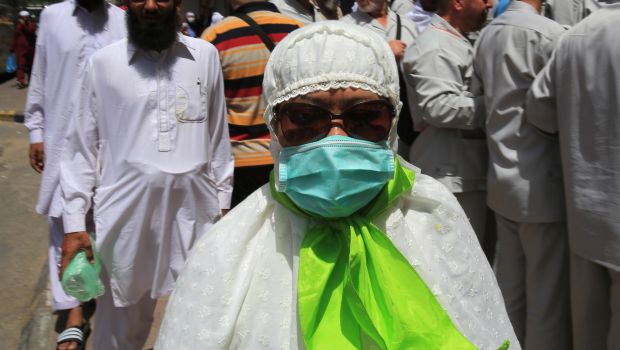
A Muslim pilgrim wears a surgical mask to help prevent infection from a respiratory virus known as the Middle East Respiratory Syndrome (MERS) in the holy city of Mecca, Saudi Arabia, on May, 13, 2014. (AP Photo/Hasan Jamali)
Jeddah, Asharq Al-Awsat—The Saudi Health Ministry has successfully gained control of Middle East Respiratory Syndrome (MERS) and has reigned in the spread of the coronavirus that causes it, a World Health Organization (WHO) official said on Wednesday.
“The Saudi Health Ministry has succeeded in a remarkable manner in controlling the spread of the coronavirus in a very short period of time. This is through two measures: the measures taken to halt the spread of the virus and by dealing with those infected in a modern, scientific manner,” the WHO’s director of the Department of Communicable Diseases for the Eastern Mediterranean Regional Office, Dr. Jaouad Mahjour, told Asharq Al-Awsat.
“These measures succeeded and secured clear results,” he added.
The latest statistics regarding show that the spread of the MERS-Cov strain of the coronavirus in the Kingdom has decreased significantly over the past month, with just 33 Saudi nationals still receiving treatment for the virus.
MERS cases recorded over the past few weeks have fallen drastically, with the last reported case being admitted to hospital on July 8, according to the WHO.
There had been fears that the influx of 6.3 million pilgrims into Saudi Arabia during the month of Ramadan could result in a resurgence of MERS cases, but intensified health measures, including self-screening, are seen to have effectively combatted the threat.
Acting Saudi Health Minister Adel Fakieh, who was appointed in April largely to work on the MERS crisis, highlighted the measures taken by the health ministry but said that the decline in new MERS cases must be dealt with cautiously.
“Preventive measures are still in place and the situation is being monitored around the clock,” he said.
Mahjour told Asharq Al-Awsat that the WHO had every confidence that the Saudi Health Ministry would be able to get the situation in the country under control and had never considered issuing travel restrictions on the country.
He added that the continuous cooperation and coordination between the Saudi Health Ministry and WHO had helped limit the virus’s spread.
